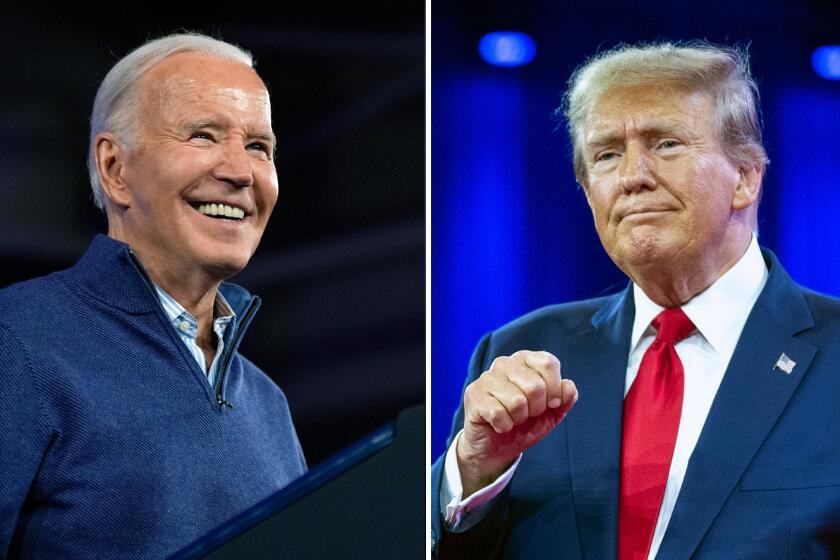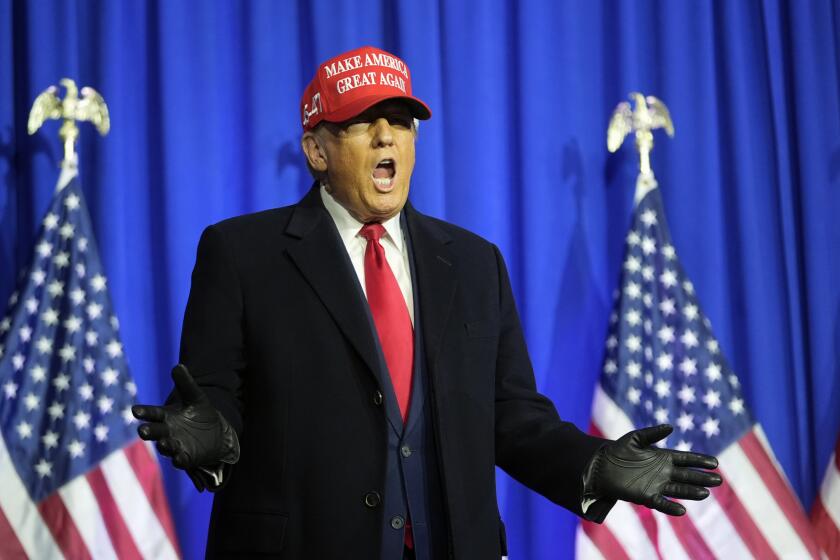Column: Trump has big plans for California if he wins a second term. Fasten your seatbelts

WASHINGTON — Donald Trump is running against California — again.
In his campaign to win a second term, the former president frequently excoriates the state as a terrifying dystopia — the inevitable product, he claims, of Democratic policies.
“The place is failing,” he told a conservative conference last month.
“It has become a symbol of our nation’s decline,” he told California Republicans last year.
“They don’t have water,” he said. “Rich people in Beverly Hills … [are] only allowed a small amount of water when they take a shower. That’s why rich people from Beverly Hills, generally speaking, don’t smell so good.”
He accused Gov. Gavin Newsom of telling undocumented migrants, “If you come up, we’re going to give you pension funds…. We’ll give you a mansion.” (Newsom has never promised migrants pension funds or mansions.)
Under its current policies, Trump charged, the state can “take children away from their parents and sterilize them.” (California does not seize children to sterilize them.)
“He’s destroyed California,” Trump said of the governor, whom he recently gave a new and strikingly unattractive nickname: “Gavin New-Scum.”
California-bashing has become a standard feature of GOP rhetoric, of course. A national survey for The Times this year found that almost half of Republicans believe the state is “not really American.”
What makes Trump’s version more than mere blather is that he could be president next year, and he has big plans for California if he wins.
He has promised to use an expansive view of presidential power to undo state laws and policies on many fronts, including areas such as law enforcement and education where states, not the federal government, have traditionally been in charge.
Biden and Trump offer converging narratives about the country: one optimistic, one apocalyptic. That collision is the core of the 2024 election.
Some examples:
He says he’ll close the U.S.-Mexico border on his first day in office — the day he has set aside to act as “a dictator” — and launch “the largest domestic deportation operation in American history.”
His Santa Monica-born immigration advisor, Stephen Miller, says that if Democratic states such as California don’t cooperate, Trump could order National Guard units from red states such as Texas to cross their borders — a recipe for constitutional crisis.
Trump has promised to scrap President Biden’s programs to promote renewable energy, including subsidies for electric vehicles and charging stations. His advisors have proposed limiting California’s power to set fuel emission standards for automobiles.
He says he’ll stop the state from allowing Sacramento River water to flow into the Pacific to protect the Sacramento Delta. “We’re not going to let them get away with that any longer,” he said. (Water experts say it would be impractical and environmentally disastrous to divert the river’s flow completely. Newsom has already suspended some environmental laws to send more water to reservoirs and is preparing to build a new water tunnel under the delta.)
Tariffs on foreign goods aren’t paid by other countries; they’re paid by American consumers — and they often fail to protect jobs.
Trump says he’ll send federal law enforcement officers into Oakland and other cities to stop rampant shoplifting. “If you rob a store, you can fully expect to be shot as you are leaving that store — shot!” he said.
And he says he will prosecute California healthcare providers if they comply with a state law that prohibits releasing information about minors’ gender-related medical care to other states. (He called the law a “sick California scheme for violating federal laws against kidnapping [and] sex trafficking.”)
Those proposals suggest that a second Trump term, like the first, would produce major collisions between the White House and California’s Democratic state government.
“If campaign promises have any meaning, you’re looking not just at a second term; you’re looking at Trump on steroids,” said Larry Gerston, an emeritus professor of political science at San Jose State University. “The impact on California would be very real. Abruptly removing huge numbers of undocumented immigrants, for example, would disrupt all of our lives ... and be a big hit to the economy.”
Trump hasn’t officially won the Republican nomination. But he’s already throwing his weight around on foreign policy — and Republicans in Congress are falling in line.
Many of those proposals are retreads from Trump’s first term as president from 2017 to 2021. Some, like his attempt to repeal California’s emissions standards, were blocked by courts after state lawsuits.
But Trump may stand a better chance of success the second time around.
His first term was launched with little preparation and no detailed transition plan. This time, he’s likely to appoint a more thoroughly Trumpified White House staff and Cabinet, with fewer moderates applying the brakes.
The Supreme Court, with three Trump appointees in its six-seat majority, is friendlier too.
And pro-Trump policy wonks have already produced a 920-page handbook of policy proposals for a second Trump term, “Project 2025.”
“This is a very big deal,” said Donald F. Kettl of the University of Texas, an expert on federal-state relations. “At the end of the first Trump term, there was frustration among his aides that they had finally figured out what they wanted to do, but ran out of time. They’ve spent four years planning, learning from their mistakes and compiling an action plan.”
Some of their ideas would still be difficult to carry out, Kettl noted.
“Sending troops out into the country to look for migrants waiting for their court dates would be very tough to implement,” he said.
But even the less bellicose actions Trump has proposed could have major effects on California and other Western states. I’ll explore them in more depth in future columns.
More to Read
Get the L.A. Times Politics newsletter
Deeply reported insights into legislation, politics and policy from Sacramento, Washington and beyond. In your inbox three times per week.
You may occasionally receive promotional content from the Los Angeles Times.














